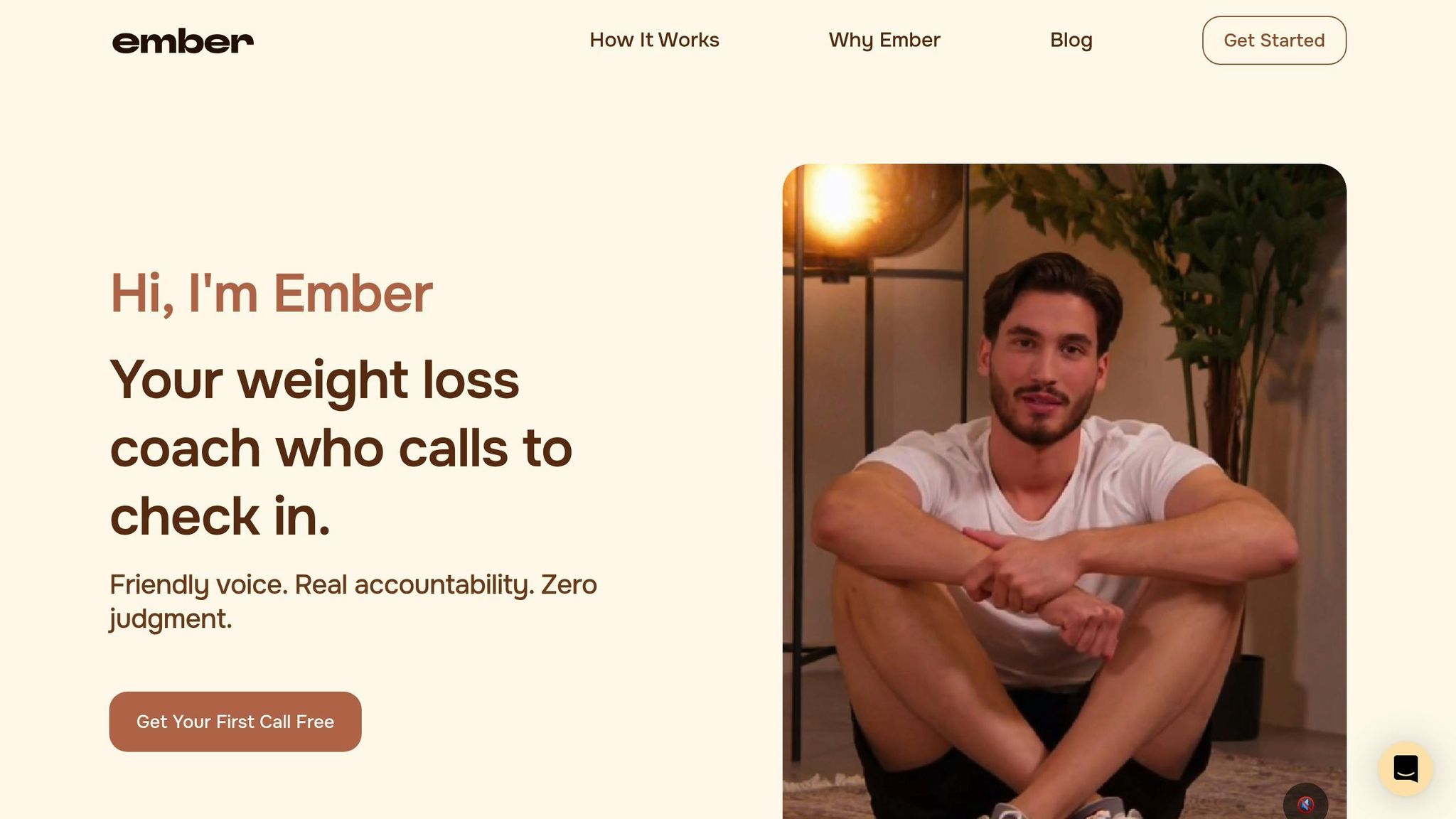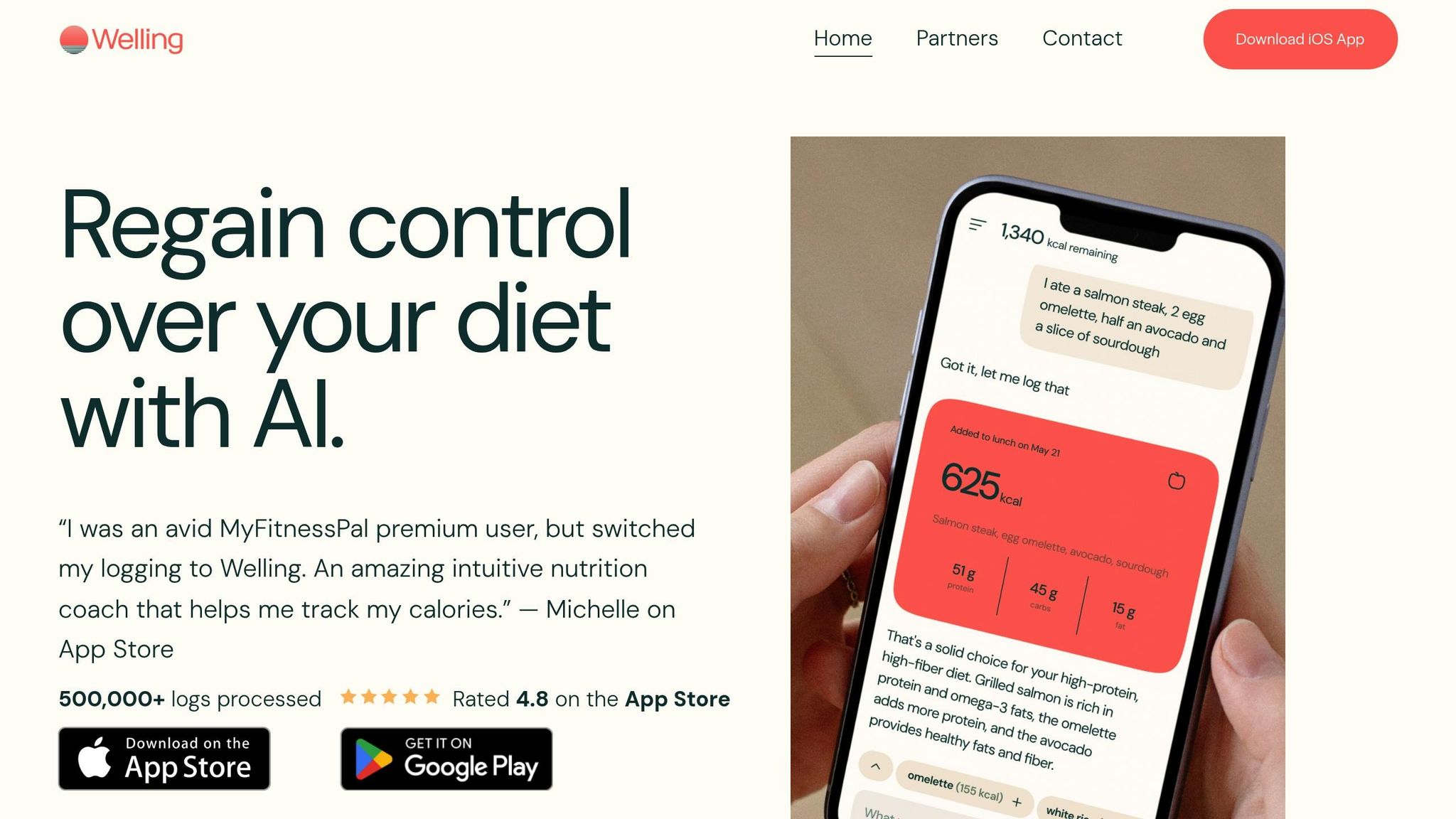
Do You Need an Accountability Coach to Lose Weight?
Losing weight is hard, but having accountability can make a big difference. Here’s what you need to know:
- Why Accountability Matters: Regular check-ins and support help turn short-term efforts into lasting habits. Studies show 73% of people with coaching lose weight, compared to just 26% without it.
- Types of Accountability: You can choose between traditional human coaches or AI tools like Ember. Both offer goal-setting, progress tracking, and strategies for overcoming challenges.
- AI vs. Human Coaching:
- Human Coaches: Provide emotional support and tailored advice, with an average weight loss of 9.6% for clients.
- AI Tools (e.g., Ember): Offer 24/7 availability, daily check-ins, and personalized plans at a lower cost.
Quick Comparison
| Feature | Human Coaching | AI Coaching (e.g., Ember) |
|---|---|---|
| Availability | Scheduled sessions | 24/7 |
| Cost | Higher | Lower |
| Support | Emotional and nuanced | Data-driven |
| Personalization | Emotion-based insights | Real-time data insights |
| Progress Tracking | Monthly updates | Daily updates |
If you’ve struggled with consistency, either option could boost your success rate from 25% (self-motivation) to 95%. Choose based on your need for emotional connection versus constant availability.
What Accountability Coaches Do
Setting Clear, Personal Goals
Accountability coaches help transform vague ideas into specific, achievable goals that fit your lifestyle. Whether it’s planning balanced meals or scheduling regular workouts, they break down big objectives into manageable steps.
Regular Check-ins and Support
Coaches provide consistent check-ins to monitor your progress. They celebrate your successes, help you work through challenges, and shift unhelpful thought patterns into constructive ones.
Tackling Common Challenges
Accountability coaches are skilled at addressing common weight-loss hurdles. They focus on understanding your personal triggers and creating strategies to address them:
- Emotional eating: Recognize triggers and develop healthier coping mechanisms.
- Plateaus: Adjust your plan and reignite motivation.
- Procrastination: Identify mental barriers and simplify tasks to keep things moving.
They also help you stay on track when life gets hectic by prioritizing tasks and reassessing goals regularly. With their outside perspective, they often spot solutions you might miss.
AI tools can replicate many of these strategies, offering features like goal-setting prompts, automated check-ins, and personalized solutions. These human-led methods are paving the way for scalable, AI-driven accountability. Up next, we’ll dive into how Ember provides this kind of support.
AI Coaching for Weight Loss
How Ember Keeps You on Track

Ember provides daily, personalized AI calls designed to fit seamlessly into your schedule. These calls review your progress, address challenges, and outline clear next steps. With round-the-clock availability, Ember adjusts its recommendations based on your preferences and results. Here's a breakdown of the key features that make these calls effective.
Ember's Main Tools and Options
- Daily check-ins: Regular reviews to keep you accountable
- Dietary guidance: Customized advice for plans like keto, intermittent fasting, and more
- Activity monitoring: Tracks your workouts and daily movement
- On-demand help: Instant support for emotional eating or late-night cravings
Why AI Coaching Works
Research indicates AI-based weight-loss coaching can lead to an average 1.5% reduction in starting body weight. Ember builds on this by offering:
- Reliable support without the hassle of scheduling
- Insights based on real-time data to fine-tune your plan
- Instant access whenever you need motivation
- Personalized strategies that evolve with your habits
Up next, we’ll explore how AI coaching stacks up against human coaching.
Lose Weight With AI? (Welling Nutrition Tracking App Review)

sbb-itb-09f2e92
Different Types of Coaching
Let’s dive into how Ember's AI approach stacks up against traditional coaching. Professional coaches typically help clients achieve an average weight loss of 9.6%, with 56% of participants reaching a reduction of 10% or more. This is achieved through scheduled one-on-one sessions that combine expert advice, in-depth discussions, and emotional support. In one study, participants rated the autonomous support from professional coaches highly, scoring 6.6 out of 7 on a support scale.
Here’s a quick comparison between the two approaches:
- Availability: Traditional coaching relies on scheduled sessions, while AI coaching is accessible 24/7.
- Cost: Professional coaches tend to be more expensive, whereas AI coaching is often a more budget-friendly option.
- Support: Human coaches provide emotional and nuanced interactions, while AI focuses on theory-driven support.
- Personalization: Traditional coaching thrives on emotional insights, while AI uses data to tailor its guidance.
- Tracking: Human coaches typically track progress monthly, while AI offers daily updates.
While professional coaches excel at building emotional connections and providing tailored advice, AI coaches shine in offering constant availability and scalable tools for tracking progress and staying motivated.
Think about your priorities - whether it’s emotional connection or round-the-clock accountability - to decide which coaching style fits your goals best.
Do You Need a Coach?
After weighing the differences between AI and human coaching, consider whether either option suits your needs.
Motivation alone has about a 25% success rate, but adding a coach - whether a person or Ember's AI - can boost that success rate to 95%.
What to Consider First
- Past Attempts: If you've struggled with consistency in the past, regular check-ins (whether with a human or AI) could help you stay on track.
- Support System: Friends can provide encouragement, but coaches focus specifically on your goals - even during busy weeks.
- Habits and Triggers: Coaches can customize strategies to match your personal style and preferences.
Addressing Common Concerns
Time Commitment
Coaching is designed to work within your schedule. Short, focused check-ins can help you stay on track without taking up too much time.
Coaching Approach
Accountability coaches often take on multiple roles. They motivate you like a friend, help you plan like a strategist, and guide you through behavior changes.
These factors can help you choose a coach whose methods and structure align with your needs.
Next, we'll guide you through making your final decision.
Making Your Choice
Did you know that 81% of New Year's resolutions fail within weeks? That’s why it’s important to carefully consider your past habits, the kind of support you need, and how you prefer to stay on track when making your decision.
For instance, Ember's AI calls are designed to fit into your routine seamlessly. They provide daily check-ins and on-demand support whenever you need a little extra help. Research shows that people typically look for one of three things from accountability support: achieving goals, staying disciplined, or finding motivation.
Coaching, on the other hand, combines encouragement with straightforward feedback. The most effective methods offer these three key advantages:
- Regular check-ins help you stay on top of short-term tasks that lead to long-term success.
- External support keeps you focused, even when your motivation dips.
- Data-driven insights help you build habits that stick.
Take a close look at your schedule, your level of commitment, and the type of support that feels right for you. The goal is to find an accountability system that fits smoothly into your life while helping you achieve lasting progress.